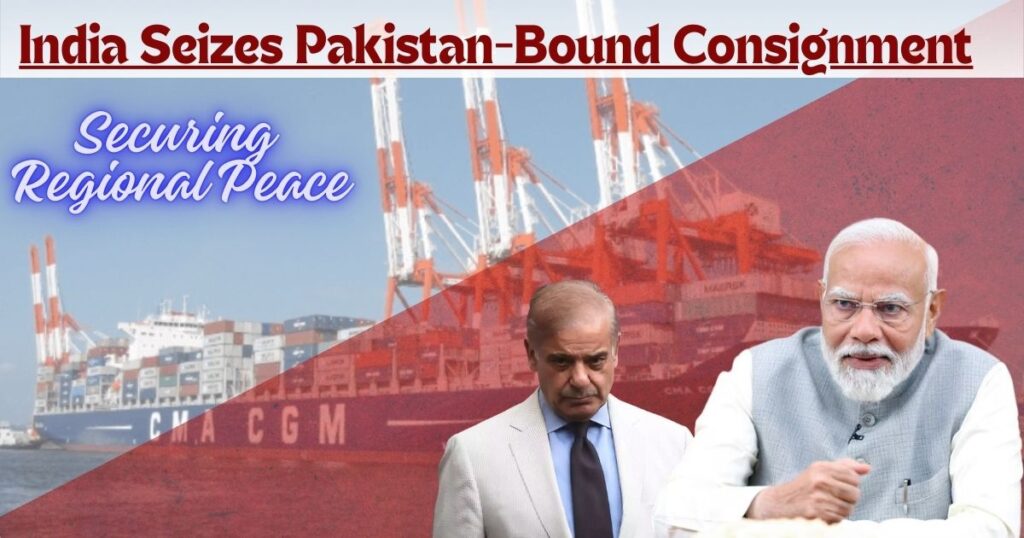In a significant move, Indian authorities recently intercepted a consignment bound for Pakistan from China, containing banned chemicals and dual-use items. As India seizes Pakistan-bound consignment, this action highlights India’s vigilance and has broader implications for regional and global security. Here’s an in-depth look at the situation and its potential impact, particularly from the perspective of the United States.
India Seizes Pakistan-Bound Consignment: A Triumph for Regional Security
In late June, Indian customs officials intercepted the Malta-flagged ship CMA CGM Attila at Mumbai’s Nhava Sheva port. The cargo, declared as industrial machinery, contained a Computer Numerical Control (CNC) machine and chemicals that could be converted into CS gas, a potent crowd control agent. This seizure underscores India’s proactive measures in monitoring and intercepting shipments that could enhance Pakistan’s military capabilities.
India Seizes Pakistan-Bound Consignment: Protecting Citizens from Chemical Weapons
CS gas, commonly known as tear gas, is banned in warfare under the Chemical Weapons Convention but is sometimes permitted for domestic law enforcement. However, its use in Pakistan has raised significant human rights concerns. In 2022, following the arrest of former Prime Minister Imran Khan, Pakistani security forces used CS gas extensively on protestors, leading to widespread illness. The intercepted consignment included 2,500 kg of chemicals likely intended to produce more CS gas, indicating preparations for future civil unrest.
India Seizes Pakistan-Bound Consignment: Enhancing Global Security by Tackling Dual-Use Technologies
The interception also highlights ongoing concerns about Pakistan’s procurement of dual-use technologies from China. Dual-use items have both civilian and military applications, and their transfer is tightly controlled to prevent misuse in weapons programs. The seized CNC machine, capable of precision engineering required in missile production, exemplifies such dual-use concerns. This incident follows a pattern of Chinese entities supplying restricted items to Pakistan, as evidenced by past sanctions from the US Bureau of Industry and Security against Chinese companies for similar violations.
Economic and Political Ramifications
Pakistan’s current economic instability, exacerbated by IMF-imposed austerity measures, has led to widespread public dissatisfaction. Recent budget policies have increased taxes significantly, including on agricultural income, sparking fears of mass protests similar to those seen in Kenya. The Pakistani government, anticipating civil unrest, may resort to harsh measures, including the use of CS gas, to maintain order.
Implications for the United States
For the United States, this situation presents several concerns. Firstly, the proliferation of dual-use technologies and chemicals in volatile regions undermines global security frameworks. Secondly, the humanitarian aspect of using chemical agents against civilian populations is alarming. Lastly, the geopolitical dynamics of China supplying such items to Pakistan pose a challenge to US interests in promoting regional stability and preventing the escalation of military capabilities in South Asia.
Ensuring Global Security
India’s interception is a reminder of the importance of vigilance and international cooperation in controlling the spread of potentially dangerous technologies. It also highlights the ongoing tensions in South Asia, where economic pressures and political instability can quickly escalate into broader security crises.
Engage with Us
What are your thoughts on the interception of this consignment? Do you believe international regulations on dual-use technologies are sufficient? How should the global community respond to the use of chemical agents in domestic conflicts? Share your opinions in the comments below.
This incident serves as a critical reminder of the interconnected nature of global security and the need for robust mechanisms to prevent the misuse of technology and chemicals. As the situation unfolds, the international community will closely watch the developments and their broader implications for regional and global stability.

